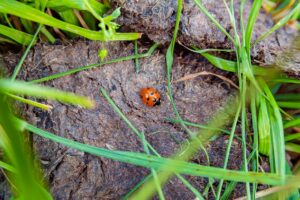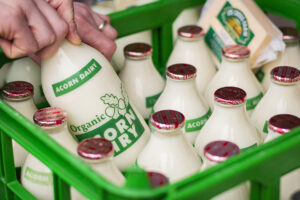This year marks our 25th year of farming organically, and we can safely say it’s the best decision we’ve ever made.
The story begins in 1998, by which point the Tweddle family had been farming at Archdeacon Newton, near Darlington, for 70 years.
However, as public awareness of the quality and traceability of the food we eat became more vocal, we decided to convert the 360-acre Garthorne Farm to Soil Association organic status.
Our passion for our animals, the environment and the produce we create were the main drivers behind our decision, but in honour of this special occasion, we’ve come up with 25 tips for and advantages of the organic way of life…
- No pesticides on your plate
Long term pesticide exposure of pesticide traces has been linked to cancers, such as leukaemia and non-Hodgkin’s lymphoma, as well as asthma, depression and anxiety, attention deficit and hyperactivity disorder (ADHD) and the development of neurodegenerative diseases such as Parkinson’s disease.
- A healthier environment
Throughout crop and harvest, multiple pesticides and herbicides are applied to non-organic crops. The impact of this is gaps and toxic build up within the wild food chain. Insects need specific foliage, birds need insects, hedgehogs need bugs and slugs and so on, so by removing this build up, we can create an environment that thrives.
- More bees
Bees are great, and in recent years, the world has woken up to just how much we need our helpful little pollinators. With no harmful pesticides, organic farming allows bees to thrive.
- Reduced emissions
Organic farming lowers the risk of environmental pollution and helps reduce greenhouse gas emissions by restricting the use of manufactured chemical fertilisers and pesticides, all of which come from burning fossil fuels.
- As nature intended
Organic food will also be non-GMO (that’s genetically modified). This refers to the practice of tampering with an organism’s genes to create a desired result – and the full implications of this meddling are not yet known.
- Back to basics
In the absence of chemical fertilisers, organic farmers must build fertile soils naturally, using compost and manure (we use our cows’ own), and rotating crops to keep soils healthy.
- Healthier soil
Organic farming creates healthy soil and, as a result, organic farmland stores on average 3.5 tonnes extra carbon per hectare than standard, and organic soils are around 25 per cent more effective at storing carbon long-term.
- Planet-friendly meat
Grazing animals are a vital part of the eco-system, so by choosing meat that has been reared organically, we can make better choices and reduce some of the environmental harms caused by intensive meat production.
- Wildlife boost
More than 40 per cent of Britain’s wildlife species have declined since 1970, and more than 1 in 10 are currently facing extinction. Intensive farming practices, especially pesticide use, have been identified as the main driver of these declines.
Organic farms, however, are amazing for wildlife, providing homes for bees, birds and butterflies and meaning that, on average, plant, insect and bird life is 50 per cent more abundant on organic farms. Our organic farm now hosts 86 different birds across the year- many of which are on the red, at risk, list.
- Happier animals
For us, organic isn’t just about what we leave out – it’s about what we add. And our herd of Dairy Shorthorn cross breed cows enjoy more space in their housing during the winter and are allowed to graze outside naturally in the warmer months.
- Tastier food
Happy animals mean better produce, it’s that simple. Food that’s carefully nurtured, rather than using quick, chemical-heavy fixes, is better tasting and better for our health.
- More nutrients
Some studies have found that organic foods often contain higher levels of antioxidants and certain micronutrients, such as vitamin C, zinc, and iron than their non-organic alternatives. In fact, antioxidant levels can be up to 69 per cent higher in these foods. (Leifert & Butler, Newcastle University.)
- It makes you feel good
A study from Scotland suggested organic food may taste subjectively better and deliver greater ‘moral satisfaction’. Volunteers were given different foods and told some were ethical and some weren’t. Those who valued the idea of ethical food reported that the ethical stuff tasted better, although, if they didn’t care, the effect wasn’t the same.
- Nature Would Choose Organic
There is no doubt nature would be better off without humans altogether! That not being an option…nature would definitely want us to be organic.
So that’s 14 reasons why you should choose organic, here are 11 tips to help you on your way.
- Buy in store
Organic has a reputation for being expensive but it represents the true cost of producing food properly, without creating external costs born by wildlife, welfare, health, water quality etc But if purchasing from short supply chain through local independents, who source locally, you will generally find good value in your basket.
- Buy only what you need
The green revolution has resulted in an increase in re-useable packaging, refill stores and direct delivery from food producers. Not only does this result in less single use packaging, it also reduces food waste too. Arranging a doorstep milk delivery cuts down on emergency dashes to the shops and unnecessary, impulse purchases.
- Spot a bargain.
In the supermarkets, keep an eye out for reduced organic produce nearing its best before date. Many such products will be good eating beyond date or very happy in your freezer. (Before use -by dates we relied on ‘the sniff test.’) Grab a bargain and save it for later – always check the storage and cooking instructions though.
- Prioritise
We understand that a fully organic diet may not be affordable or feasible for many people. But making small switches can still have an impact, so why not just try one organic cheese, fruit or veg swap each week?
- Buy seasonally
Buying produce that is in season is a surefire way to cut food costs, especially when choosing organic. Non-seasonal produce will have been imported, pushing up both the price and the food miles. Making sure you’re buying what’s in season means you’ll definitely get the best price when choosing organic.
- Boxing clever
These rose in popularity during the pandemic, but veg boxes can also be a cost-effective way of introducing more organic produce to your diet. They offer a wide variety of seasonal fruit, veg, dairy and meat products, generally produced locally, and often delivered straight to your door. Riverford & Organic Pantry have good coverage in the North.
- Make a day of it
Wanting to enjoy some local, organic fruit? Why not pick your own and enjoy a day out and some fresh air while you’re at it? There are plenty of farms offering this – it tends to be the berry fruits that lend themselves to picking your own – so there’s bound to be one near you.
- Grow your own
Or, if you don’t want to just pick your own, why not grow your own – then you’ll know exactly how it’s been produced. Depending on how much time, space or knowledge you have, you can start with a few herbs on your windowsill or some raised beds in your garden for tasty, homegrown fresh fruit and veg.
- Eat better meat
This is important from a health and environmental perspective too, choosing organic meat when you do maximises the health benefits.
- Shop local
Farm shops and independent retailers have flexibility to choose their own suppliers and are therefore a great way to pick up some organic produce, reduce food miles and keep your £ in the local economy. If they don’t have something you want- ask them to try and get it for you.
- Swap your basics
Our milk and butter are produced on our organic farm from our happy, healthy cows. What’s more, we offer doorstep deliveries across County Durham and North Yorkshire, meaning we keep food miles to a minimum. You will be making a positive impact everyday, if you swap to Acorn Dairy milk.
So that’s our 25 top tips for going organic – here’s to the next quarter of a century! And if you’d like to add a little organic to your morning brew, head over to our delivery page here.



